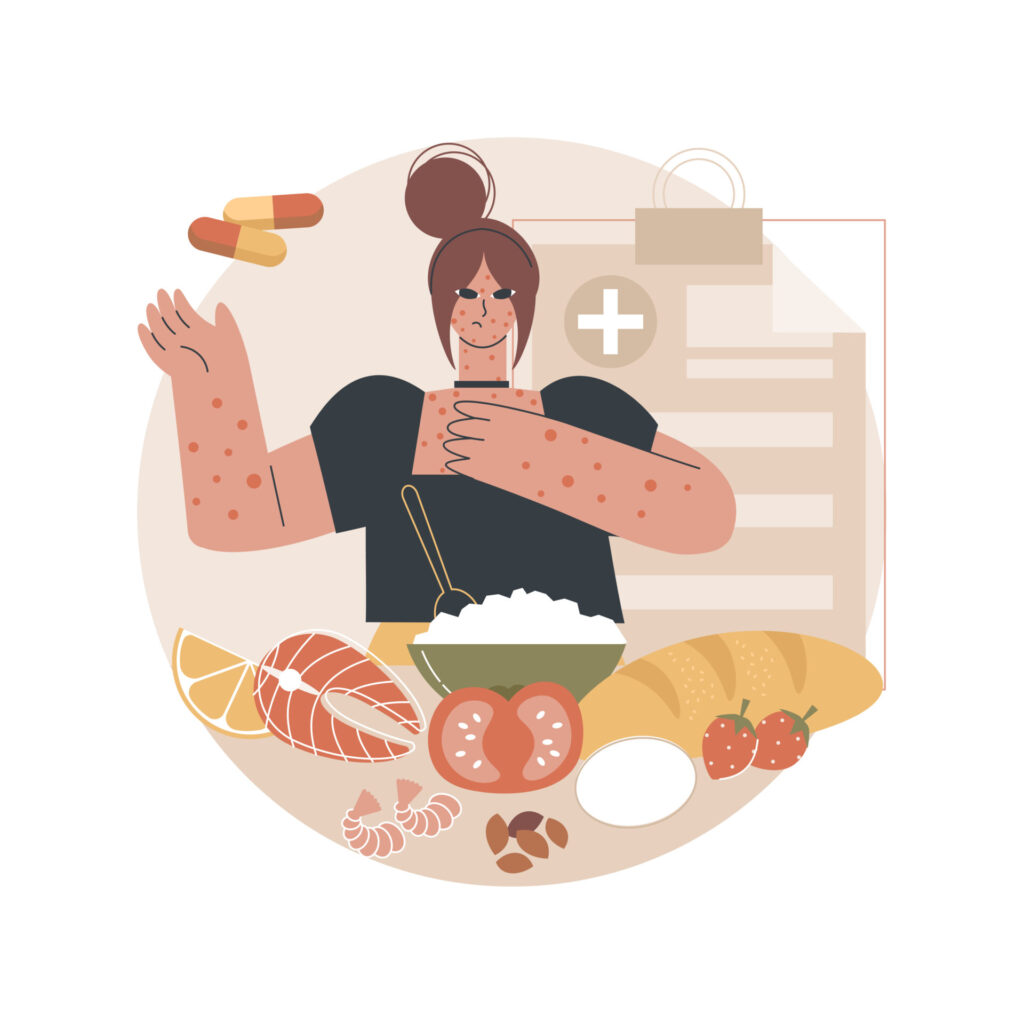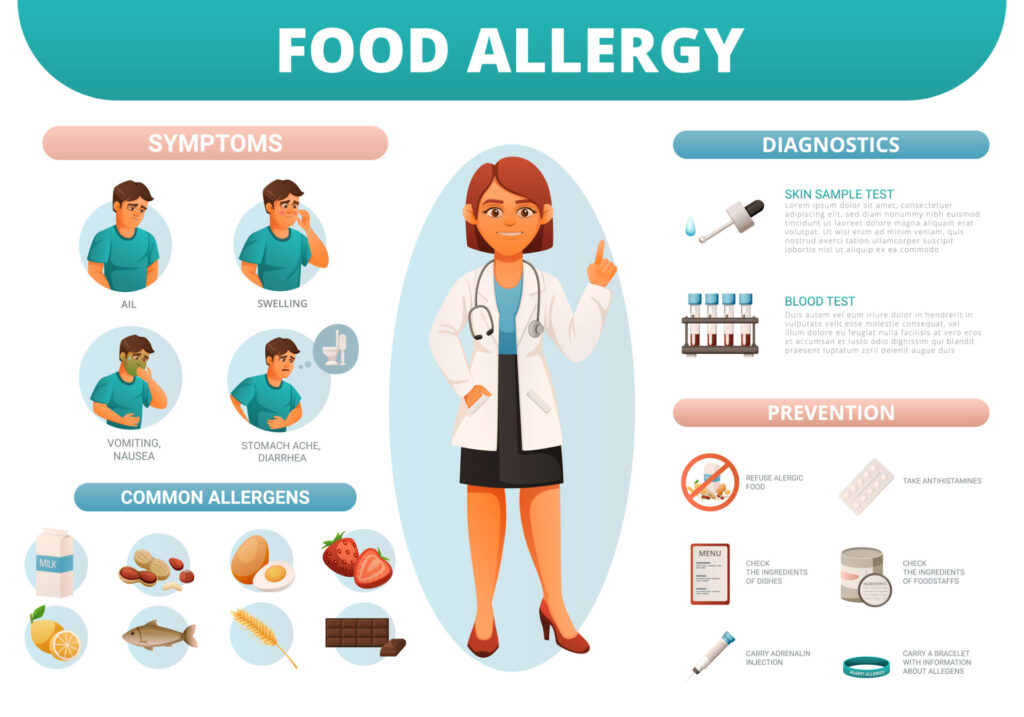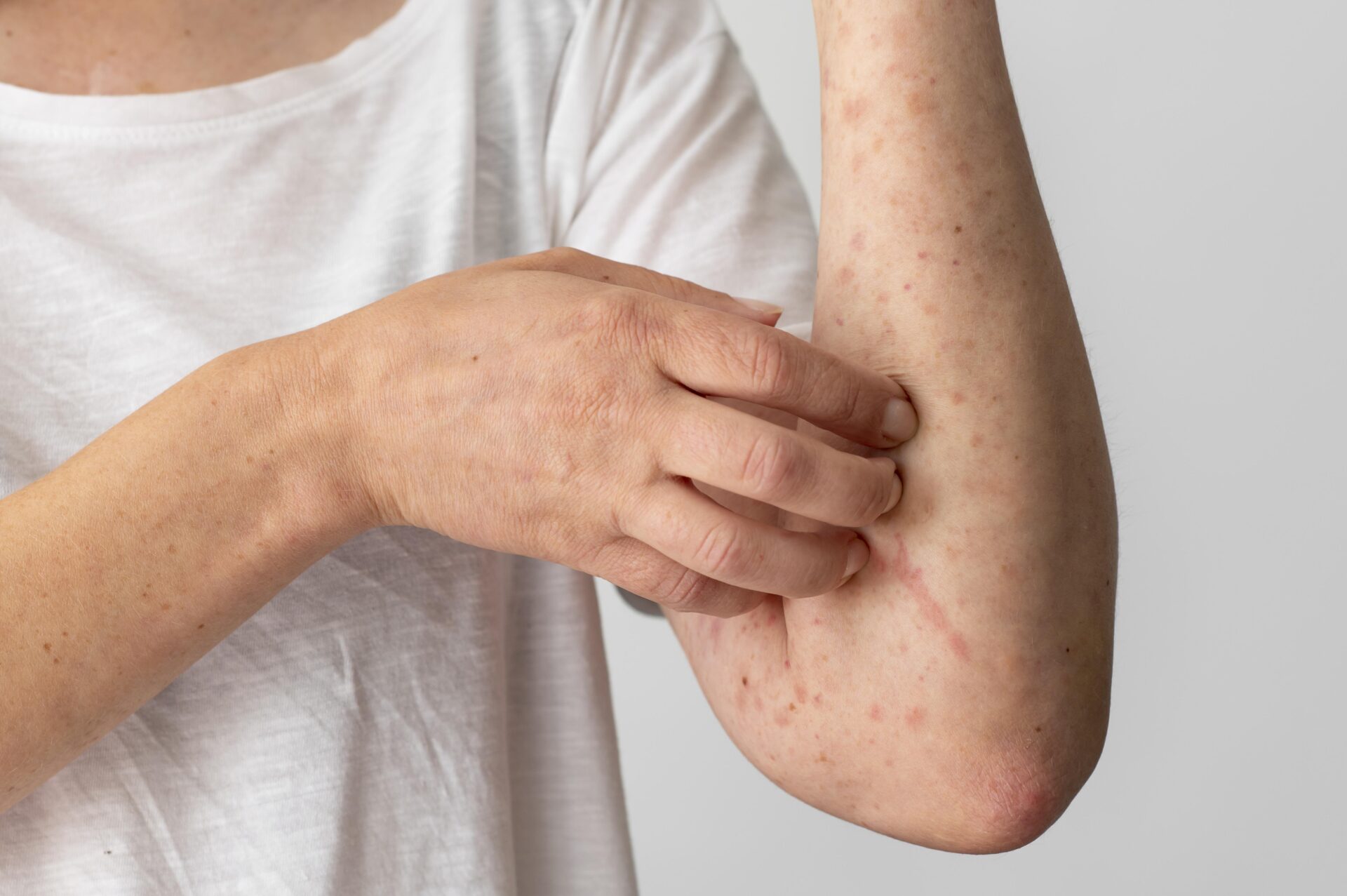Read DISCLAIMER
Discover 20 crucial insights for safer living with food allergies. From label reading to dining out strategies, this comprehensive guide empowers individuals to navigate the complexities of food allergies confidently.

Introduction
Having dietary allergies necessitates being watchful to protect safety and wellbeing in daily life. The following 20 important realizations and pointers will greatly help in navigating the difficulties of food allergies:
1. Educate Yourself: It’s important to comprehend the triggers, hazards of cross-contamination, and particular allergies you may have.
2. Read Labels Carefully: Pay close attention to food labels for details on allergens, components that may be concealed, and any possible cross-contact warnings.
3. Communicate Clearly: Let people know about your sensitivities, including friends, family, caretakers, and restaurants. To keep safe, communication must be clear.
4. Always Carry Prescription Medication: Keep antihistamines and epinephrine auto-injectors on hand in case of emergency.
5. Make an Allergy Action Plan: Draft and distribute an action plan that outlines what to do in the event of an allergic response.
6. Steer free of Risky Foods: Steer clear of foods that may contain allergens you are allergic to, or that have come into touch with them.

read more posts
7. Cook at Home: Cooking at home gives you more control over the materials and lowers the chance of unintentional exposure.
8. Eating Out Safely: Inform the staff about your dietary restrictions while you are at a restaurant, inquire in-depth about the production of the food, and select reputable establishments that follow allergy-friendly procedures.
9. Be Educated About Substitutes: To safely enjoy a wide range of meals, get knowledgeable about substitute components.
10. Watch Out for Cross-Contamination: Allergens can cause responses even in minute amounts. Thoroughly wash your hands, utensils, and cooking surfaces.
11. Keep Up with Allergen rules: To make educated decisions, stay up to speed on allergen rules and food labeling regulations.
12. Make Travel Plans in Advance: Find out what Food and Medical Facilities are Available at Your Destination. When traveling, bring healthy snacks.
13. Speak Up for Yourself: Make sure that your demands are met in social and professional contexts and that your allergies are acknowledged and taken into consideration.
14. Allergy-Safe Social Gatherings: Let others know about your allergies and offer allergy-friendly food ideas if you’re hosting or attending a party.
15. Look for Support Groups: Get in touch with people who are dealing with food allergies to get guidance, support, and firsthand knowledge.
16. Promote Allergy Awareness: To promote awareness and support, educate peers, schools, and communities about food allergies.

read more posts
17. Be Ready for Emergencies: Keep allergy cards with information about your allergies and emergency contacts on them, and periodically check the expiration dates on prescription drugs.
18. Recognize Restaurant Menus: Research menus online before to going out to eat, and give the chef or manager a call in advance to discuss allergy modifications.
19. Watch Out for Snacks: Examine the components in packaged foods and snacks, even if they’ve been proven safe in the past, as product formulas might change.
20. Maintain Your Positive Attitude and Resilience: In spite of the difficulties, concentrate on the actions you can take to manage your food allergies and have a happy life.
People with food allergies may navigate life safely and confidently, lowering the risk of allergic responses and enjoying a greater quality of life, by implementing these insights into everyday routines. Always seek the counsel of medical specialists for individualized recommendations and assistance.
read more posts
In summary:
Having dietary allergies necessitates a multimodal strategy that includes readiness, communication, education, and fortitude. These twenty essential insights provide people with a thorough roadmap for navigating the complex world of food allergies. Every tip makes a big difference in promoting a safer workplace, whether it’s via attentive reading of labels, proactive communication, making action plans for allergies, or pushing for adjustments.
In the end, the keys to managing food allergies are awareness and readiness. Despite the difficulties caused by food allergies, people may reduce risks and have richer lives by being knowledgeable, speaking clearly, and taking initiative in a variety of contexts, including social events, dining out, traveling, and at home. Maintaining current tactics, maintaining relationships with support systems, and obtaining expert advice are critical for ensuring safety, wellbeing, and empowerment when negotiating the challenges posed by food allergies.
read more posts
FAQs about Food Allergies with Answers:
1. Q: What are the most common food allergens?
A: Common allergens include peanuts, tree nuts, dairy, eggs, soy, wheat, fish, and shellfish.
2. Q: Can food allergies develop later in life?
A: Yes, it’s possible for adults to develop new food allergies, although less common than in childhood.
3. Q: Are there specific tests to diagnose food allergies?
A: Tests like skin prick tests, blood tests (specific IgE), and oral food challenges help diagnose allergies.
4. Q: How can I manage food allergies at restaurants?
A: Communicate allergies, ask about food preparation, and choose eateries with allergy-friendly practices.
5. Q: What should I do during an allergic reaction?
A: Use prescribed medications like epinephrine, seek immediate medical help, and follow your allergy action plan.
6. Q: Can food allergies be outgrown?
A: Some childhood allergies, like milk or egg, can be outgrown, but others may persist into adulthood.
7. Q: Are there allergy-friendly substitutes for common allergens?
A: Yes, alternatives like soy milk, almond flour, or seed-based butters can replace allergenic ingredients.
8. Q: What is cross-contact, and how can I prevent it?
A: Cross-contact occurs when allergens inadvertently come into contact with safe foods. Prevent it by cleaning surfaces, utensils, and hands thoroughly.
9. Q: Can food allergies cause anaphylaxis?
A: Yes, severe allergic reactions can lead to anaphylaxis, requiring immediate medical attention.
10. Q: How can I educate others about food allergies?
A: Share resources, provide accurate information, and promote allergy awareness in schools and communities.
11. How to test for food allergies?
– Testing for food allergies involves various methods such as skin prick tests, blood tests (specific IgE), and oral food challenges. These tests are typically conducted by allergists or immunologists to identify specific allergens triggering reactions.
12. What are food allergies and their causes?
– Food allergies are immune system reactions triggered by specific foods. When the body mistakenly identifies certain proteins in food as harmful, it reacts by releasing chemicals that cause allergic symptoms. The causes can vary, but common allergens include peanuts, tree nuts, dairy, eggs, soy, wheat, fish, and shellfish.
13. Which food items need extra caution around allergies? What are the most common food allergies?
– Extra caution is necessary around common allergens such as peanuts, tree nuts, dairy, eggs, soy, wheat, fish, and shellfish. These foods often cause allergic reactions, and individuals allergic to these should be vigilant about reading labels and avoiding cross-contamination.
14. How can an operation assist customers with food allergies?
– Operations such as restaurants can assist customers with food allergies by offering detailed allergen information on their menus, having well-trained staff to handle allergy-related queries, preparing allergen-free meals in separate areas to avoid cross-contact, and being transparent about their ingredients and food preparation methods.
15. How long do food allergies last?
– Food allergies can vary in duration. Some children may outgrow certain allergies, while others might persist into adulthood. The duration of an allergy largely depends on the individual and the specific allergen. Consulting an allergist or immunologist can provide more personalized insights into the duration of food allergies.

Thank you for supporting us. Your encouragement gives us the strength to keep moving forward.
Thanks for sharing. I read many of your blog posts, cool, your blog is very good. https://accounts.binance.com/kz/register?ref=RQUR4BEO
I don’t think the title of your article matches the content lol. Just kidding, mainly because I had some doubts after reading the article.
This blog post is worth the read – trust us!
Your article helped me a lot, is there any more related content? Thanks!